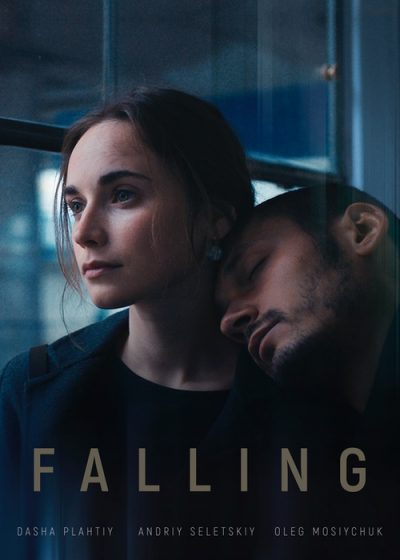
“Falling” (“Strimholov”) (2017 production, 2022 release). Cast: Andriy Seletskiy, Dariya Plakhtiy, Oleg Mosijchuk, Christian Borys, Larisa Rusnak. Director: Marina Stepanska. Screenplay: Marina Stepanska. Web site. Trailer.
So it is for Anton (Andriy Seletskiy) and Katya (Dariya Plakhtiy). They’re both something of a puzzle, both to others and to themselves. And, with the uncertainty hanging over them in 2015, the prevailing conditions have left them just as uncertain about themselves. That’s the point from which their stories begin in this slowly unfolding drama, which reveals the nature of their circumstances slowly and in piecemeal fashion after a chance meeting outside a Kyiv nightclub.
Anton is perhaps the bigger enigma of the two cryptic protagonists. He’s recently rejoined the outside world after a protracted stay in a substance abuse rehabilitation center. The onetime virtuoso musician has come to live with his aging grandfather (Oleg Mosijchuk) in a cabin in the woods on the outskirts of Kyiv. Grandpa provides a degree of stability, tinged with a restrained but firm sense of tough love and an overall outlook shaped by having lived for years under Soviet rule. He’s willing to help out his grandson as he adjusts to life on the outside once again, but he’ll only go so far and doesn’t hesitate to make his reservations known, such as his disapproval over Anton’s plan to pay a visit to his alcoholic mother (Larisa Rusnak). He’s concerned that Anton will backslide under his mother’s influence, undoing all the progress he’s made. But Anton’s visit is short-lived as his mother wanders off on her own, leading him to the realization that attempting to maintain a relationship with her is fruitless – and in myriad ways.
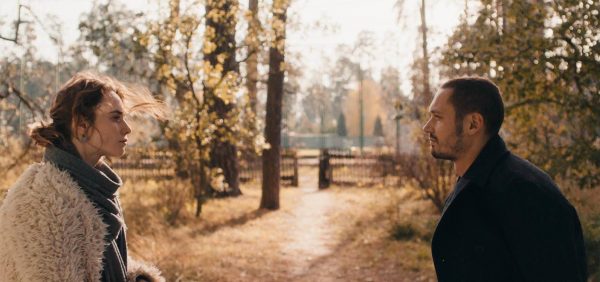
As Anton struggles to find his way, so, too, does Katya, who lives in a Kyiv housing complex with her German boyfriend, Johann (Christian Borys), a photojournalist who journeyed to Ukraine to chronicle the Maidan Uprising a year earlier and is now ready to return to Berlin. He wants Katya to accompany him, but she has her doubts, both about the relocation and the future of her relationship with Johann, who’s rather intolerant of her indecisiveness. The mood at home, needless to say, is quite tense, and it prompts Katya to go off on her own to get some breathing room, not sure of where this decision will lead.
As circumstances would have it, Anton and Katya both wind up outside a Kyiv nightclub. Their chance meeting leads to a conversation and, ultimately, to subsequent encounters near Anton’s new remote home, meetings that are more than a little coincidental. They gradually get to know one another, revealing things about themselves that they both seem to have been reluctant to discuss with anyone else. A bond of trust and even tentative romance forms between them, one that has healing effects but that also raises new apprehensions, such as where this connection is actually headed. Katya still hasn’t committed to either staying in Kyiv or moving to Berlin, and Anton is quietly afraid that he might relapse given the pressures placed on him about the future of his music career and an impending call to fulfill his mandatory military service now that he’s no longer in rehab. To complicate matters further, Anton’s grandfather has suddenly taken ill, and the future of his care hangs in the balance, especially if Anton must leave home for active duty.
These dilemmas thus characterize the uncertainty that many young Ukrainians were wrestling with at the time, brought down to a personal level through the experiences of these two lost individuals. Anton and Katya, like many of their peers in the time frame of this story, can’t help but wonder what their future will bring, questions that, in the real world of today’s Ukraine, probably can’t help but have become compounded by current considerations. Indeed, how does one move forward with one’s life under conditions like these? Can the help of those similarly situated truly help in overcoming these challenges? And what if missteps occur along the way? What then? Is there anything that can genuinely combat the feeling of “falling” (in all its permutations) in the midst of such circumstances?
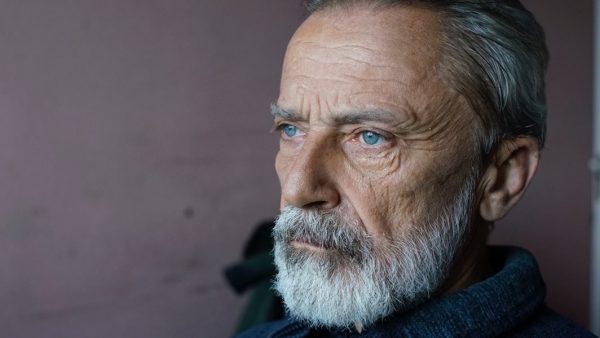
In many ways, it could be argued that the themes addressed in this film are universal to many of those in this group of contemporaries, which is why many of those in this age range can probably identify with the kinds of existential questions that these characters face. But, given the additional challenges Ukraine’s youth faced at the time and in today’s trying times – some of which are presciently foreshadowed in this 2017 offering – one can’t help but feel for their sense of being adrift and concerned about what consequences may await them.
Thankfully, because beliefs make virtually anything attainable, the protagonists – like all of us – have an infinite range of possibilities open to them, depending on which beliefs they choose to embrace and employ. However, when we operate without direction or if we’re overwhelmed by the choices, we could easily end up staying stuck in a holding pattern, with no readily identifiable goal in sight. To a certain degree that’s reflected in Anton’s woodland living environment; he can’t see the forest for the trees in his worldview, and that’s being metaphorically reflected back to him in the state of his physical existence. The choices are too numerous for him to decide on anything particular, and his environment is indicative of that.
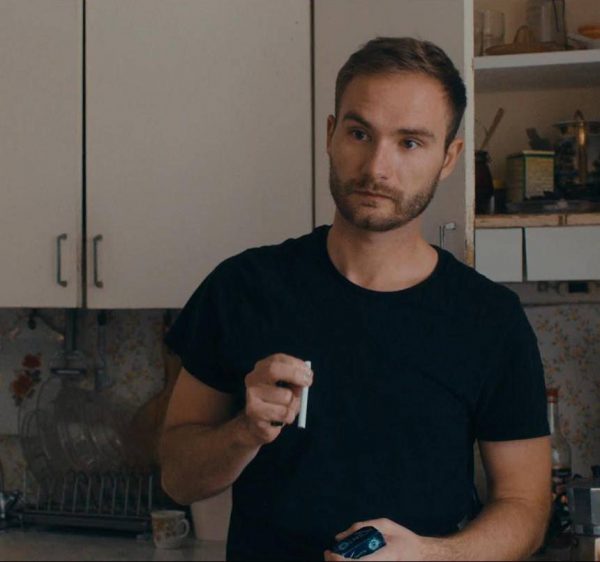
We must also be careful which beliefs we choose to embrace, and, again, Anton’s experience illustrates the importance of this. One of the possibilities that scares him most is backsliding from the progress he made in rehab, and it dangles precariously over him. In fact, it’s so daunting that it clouds his view of what could lie ahead for him in a relationship with Katya. Fears are beliefs in themselves, and, if he holds on to this one too tightly, it might manifest in what he says he least wants to happen, jeopardizing his shot at something good – perhaps the most positive development to have emerged in his life in quite some time. It’s one thing to be prudent, but it’s something else entirely to be preoccupied with, paranoid about or reconciled to such a fate, because it could very well come to pass, despite whatever objections we might think we hold about such an outcome.
Katya’s indecisiveness could just as easily get her in trouble, too. It stems from her beliefs as well and could carry significant consequences. She’s obviously drawn to Anton, who, in many ways, suits her sensibilities better than Johann does, especially since her new romantic prospect is not trying to pressure her into making a decision one way or another. But, if she wavers on this point too much, she could lose out on something that’s capable of bringing her the kind of happiness that seems to have been absent from her life of late.
The existence of ancillary considerations can interfere with the decision-making process where our beliefs are concerned. They can cloud our judgment and again leave us adrift, especially when it comes to trying to determine the direction of our future. Their creation and presence (again belief-driven) could even be seen as a form of stalling, their hindrances placing a drag on proceeding with choosing what we want to manifest. That would account for Katya’s indecision. It also might explain Anton’s concerns over his military obligation and his grandfather’s well-being.
The delay in moving ahead with the direction of one’s life might not be seen by some as a tremendous calamity. Stalemates may not be the most productive way to spend our time, but they’re often likely to be viewed as somewhat innocuous. In some situations, they may even buy us some time to assess our options before making a firm decision, potentially avoiding a huge misstep. But, if we allow ourselves to wallow in such conditions for an unduly long time, we might set ourselves up for a drastic change, one that shakes us out of our complacency and lack of progress. And such a possibility – if embraced as a subconscious belief – could carry dire consequences as well.
The foregoing is not meant to be a disparaging comment on those who find themselves in such circumstances. The conditions that placed them there, for example, may have been so unnerving and oppressive that they left them stuck, unable to move forward; in all fairness, they can’t be faulted for being overwhelmed. That’s particularly true for those who live in a place like Ukraine, which has undergone so many tumultuous changes in such a condensed period of time. However, those affected by such scenarios should also be cognizant of what could arise from standing pat; the consequences of that could be truly problematic. Let’s hope they can see their way clear to a better and brighter future, something that Ukrainians deserve given what they’ve been through.
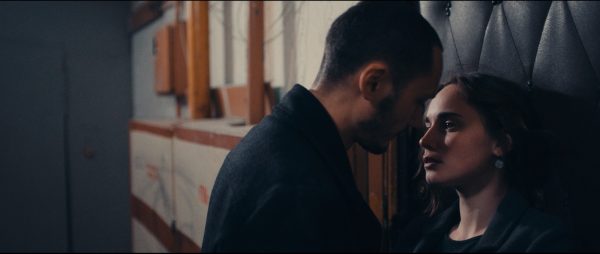
Writer-director Marina Stepanska’s multilayered 2017 debut narrative feature tackles an array of issues on both a macro and micro scale, including how they’re reflective of one another. In this unconventional drama/love story/character study, the film follows the fortunes of two young Ukrainians torn between giving up and getting back up after each time they “fall.” Their uneasy but undeniable romance provides in-the-moment flashes of happiness that they tentatively struggle to savor, no matter how fleeting and transitory they may be. It’s a story that preponderantly waxes bittersweet, often characterized by despair and listlessness but yet not without its meager though nevertheless sincere hope for better times, provided they can figure out what constitutes such a state of being. Admittedly, the narrative builds slowly (sometimes a little too much so), jealously holding on to its secrets and revealing them in carefully measured doses. But this storytelling approach manages to create a sense of anticipation that’s genuinely rewarded when the characters’ truths at last surface – and the unexpected outcomes that await them. This offering likely won’t appeal to everyone, but, for those who are sufficiently patient to wait for their payoffs, this release comes through on many levels, leaving viewers with much to contemplate in the wake of this engaging cinematic experience. The film is available for streaming online from Film Movement Plus.
Copyright © 2022, by Brent Marchant. All rights reserved.

No comments:
Post a Comment